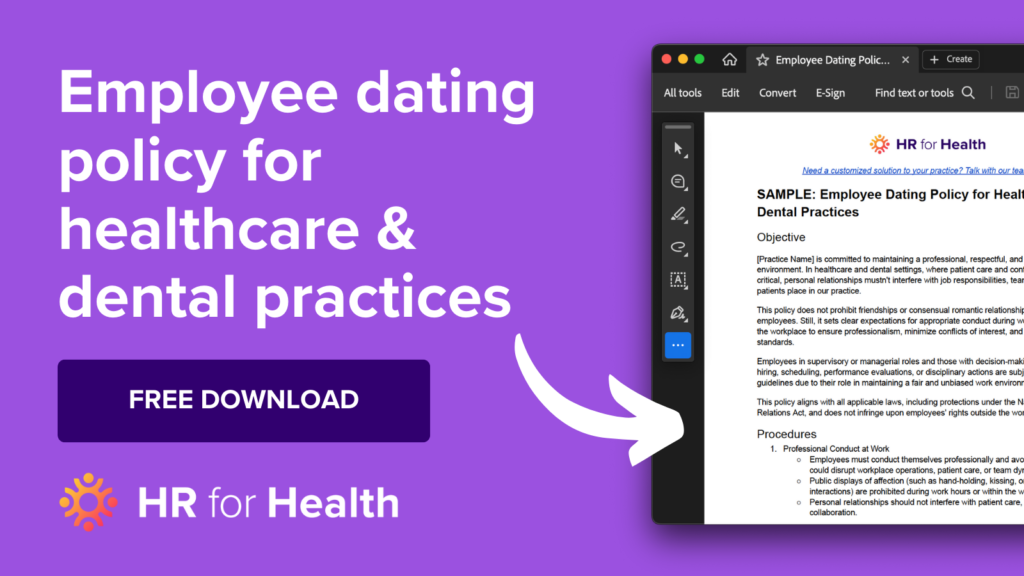Are your workplace romance policies ready for Valentine’s Day? Here’s what healthcare and dental practices need to know.
Love may be in the air this Valentine’s Day—but is it in your workplace too? If so, you’re not alone. Workplace romances aren’t just a plotline from a rom-com; they’re a reality for many businesses, including healthcare and dental practices. And while no one wants to play matchmaker with their employee handbook, ignoring the potential risks of workplace relationships can leave your practice vulnerable to legal issues and team disruptions.
So, what should you do? Let’s break it down into four key points to help you evaluate whether your workplace romance policies need a refresh.
Step 1: Acknowledge the reality of workplace relationships
You might assume that workplace relationships are rare in a professional setting like a dental or medical practice—but statistics tell a different story. Surveys have shown that a significant percentage of employees have dated a colleague at some point, with many of these relationships forming despite (or maybe because of) remote and hybrid work setups.
For healthcare and dental practices, where teamwork is essential, and employees spend long hours together, the chances of relationships forming are even higher. While some of these relationships work out, others can lead to challenges, including favoritism concerns, gossip, and, in worst-case scenarios, harassment claims.
The bottom line? If you don’t have a policy to address workplace relationships, now is the time to create one.
Step 2: Be prepared for the fallout
No one wants to think about the end of a relationship when it’s just beginning—but as a business owner, you have to. Breakups don’t just impact the people involved; they can create ripple effects throughout the workplace.
If two team members who were once dating can’t work together professionally after a breakup, it can lead to workplace tension, lower morale, and even productivity issues. Worse, if one employee has supervisory authority over the other, it can lead to claims of favoritism during the relationship—or retaliation once it’s over.
To prevent unnecessary drama and legal risks, your policy should clearly outline expectations for professionalism and behavior post-breakup. The goal is to ensure that personal relationships don’t negatively impact your practice’s operations or employee morale.
Step 3: Consider the right approach for YOUR practice
Should you ban workplace relationships entirely? Probably not. While some companies have strict anti-fraternization policies, banning workplace relationships altogether can feel invasive and may push employees to hide relationships rather than disclose them.
A more practical approach? Set boundaries where they matter most. Many healthcare and dental practices choose to prohibit relationships between supervisors and subordinates or between individuals in the same reporting chain. This helps prevent conflicts of interest and reduces the risk of favoritism claims.
You should also consider including a disclosure requirement. Encouraging employees to notify HR (or the practice owner) of a workplace relationship allows you to take proactive steps, such as adjusting reporting structures, to prevent issues down the road.
Step 4: Signing the contract of love: Your solution for transparency and compliance
Some businesses have adopted what’s called a “love contract” policy, where employees in workplace relationships sign an acknowledgment stating that their relationship is consensual and agree to notify the company if the situation changes. This can be particularly useful for healthcare and dental practices where small team dynamics can heighten tensions if a relationship turns sour.

The benefit of a love contract is that it provides documentation to protect both the practice and the employees involved. It also ensures that both parties understand their responsibilities in maintaining a professional workplace environment, even if their personal circumstances change.
Final Thoughts
With Valentine’s Day approaching, now is the perfect time to review and update your policies on workplace relationships. A well-thought-out policy helps set expectations, minimizes legal risks, and protects your practice from unnecessary disruptions.
Need help crafting the right policy for your team? HR for Health can help you develop workplace policies tailored to the unique needs of healthcare and dental practices. Let’s make sure your practice is set up for success—no heartbreak involved.
Want to learn more about HR best practices for your practice? Contact HR for Health today for expert guidance.


